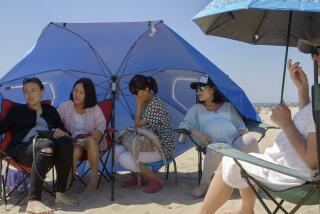Car Dealer, Immigrants Settle Suit
- Share via
In its advertisements, Wondries Toyota in Alhambra urged Chinese-speaking car shoppers to visit the dealership because it offered Mandarin-speaking salesclerks.
But it was that language expertise that, according to a lawsuit, allowed the business to use bait-and-switch tactics on unsuspecting Chinese immigrants who were falsely told they had poor credit and had to take loans with high interest.
The plaintiffs who filed the lawsuit against Wondries in 2002 announced Tuesday that they had settled with the car dealership and received an undisclosed financial sum and letters of apology.
The settlement comes two and a half months before the full implementation of a state law that will require certain business contracts to be written in four major Asian languages -- Chinese, Korean, Tagalog and Vietnamese -- when needed. Consumer advocates hope the law, whose impetus was the Wondries case, will allow consumers to rely on documents, rather than off-the-cuff translations by salesclerks.
“This is a victory, not only for these plaintiffs, but for anyone who has walked into a dealership and gotten scammed,” said the plaintiffs’ co-counsel, Hernan D. Vera, directing attorney of the Consumer Law Project for the Public Counsel Law Center.
Stephen Grande, co-counsel for Wondries, said his client was satisfied with the settlement but declined to elaborate on the company’s position. He referred questions to the apology letter, which was written in English and made no admission of wrongdoing.
“It has not been the intention of Wondries Toyota, or any of its personnel, to disrespect, mislead or mistrust any Wondries’ customers, including you,” said the form letter, signed by the dealership’s general manager, Barry Wishengrad.
“To the extent that you felt that any individual affiliated or associated with Wondries did not properly communicate with you, respond to your questions or inquiries, or provide you with the customer service to which you are entitled, I extend our most sincere apologies,” it said.
The automobile dealer also agreed to provide sensitivity training for its sales staff on how to deal with customers who do not speak English.
“It may not seem like much, but that apology was the make-it- or-break-it point for the plaintiffs,” said Manjari Chawla, an attorney for the Asian Pacific American Legal Center, which took on the case for the customers.
In the settlement, both sides agreed not to discuss how much financial compensation the plaintiffs would receive. But Chawla called the figure “fair.”
Wondries, which is based in a city whose population is 33% Chinese and 47.6% Asian overall, said it “values and respects the relationship it has with its Asian customers.” The plaintiffs in the suit were a combination of mainland Chinese and Taiwanese immigrants who spoke Mandarin, the official language of both countries.
The customers were professionally diverse. Among them were a food delivery service owner who needed a van, a retiree, a security guard and a prep chef who chopped vegetables at a Chinese restaurant.
Eight of the plaintiffs attended the morning news conference at the downtown Los Angeles offices of the Asian Pacific American Legal Center.
“Everyone has been through an extremely painful experience,” said Zhengrong Li through a Mandarin interpreter. “We felt, [after] coming to America, a great sense of helplessness.”
In August 2001, the 40-year-old import/exporter from China’s Sichuan province said, he was told by a Mandarin-speaking Wondries salesman that he would have to pay interest rates as high as 14.9% on a 1998 Camry sedan. A bank officer later told Li that he had excellent credit and qualified for 7.25%.
“Wondries should have apologized to the entire community, not just us,” Li said. “There’s no repercussion on the salespeople. On those grounds, I’m still not satisfied.”
Dong Bai, a 40-year-old immigrant from Beijing interested in a Rav 4 sport utility vehicle, said she was tricked by a Mandarin-speaking salesclerk into a higher interest rate and a $599 car alarm that she was told would be free.
“Chinese Americans who receive this kind of treatment should not sit back and endure it,” Bai said through a translator. “It’s important for us to fight back and realize our rights.”
The remaining plaintiffs were Hua Bai, Li Gang Yao, Shirley Zhang, Zhi Wu, Jian Zhao, Yong Wu, Yu Zhang, Heng Chen, Zhi Zhong and Yang Ye.
The case highlights the need for laws protecting the burgeoning Asian population in the Los Angeles area and California, said Vera, of the Public Counsel Law Center.
“This is the tip of the iceberg,” said Vera of the alleged fraud.
Although state laws requiring contracts to be translated into Spanish have existed for nearly 30 years, it won’t be until July that the same protection is applied to consumers who speak Chinese, Korean, Tagalog and Vietnamese, the four most common Asian languages in California. That’s when AB309, a bill that was introduced by Assemblywoman Judy Chu (D-Monterey Park), is fully implemented.
“This is a great victory,” said Chu in a telephone interview. “The car dealerships have denied such things go on ... but the practice of bait-and-switch is a reality.”
More to Read
Inside the business of entertainment
The Wide Shot brings you news, analysis and insights on everything from streaming wars to production — and what it all means for the future.
You may occasionally receive promotional content from the Los Angeles Times.











